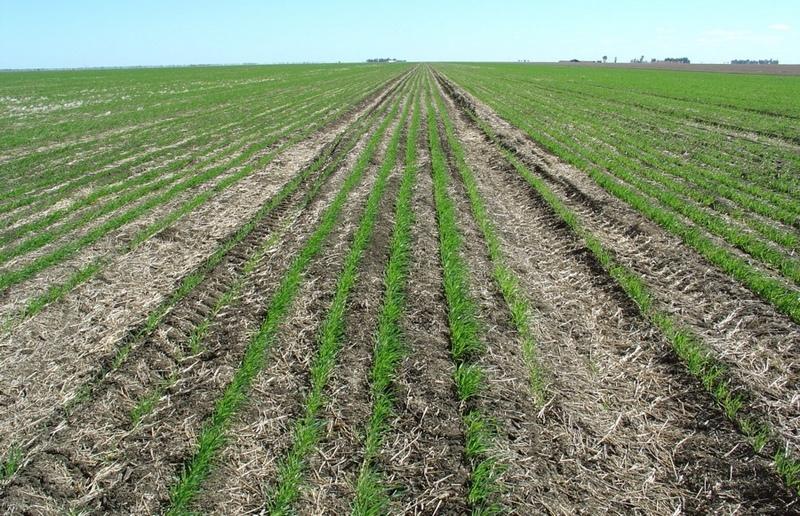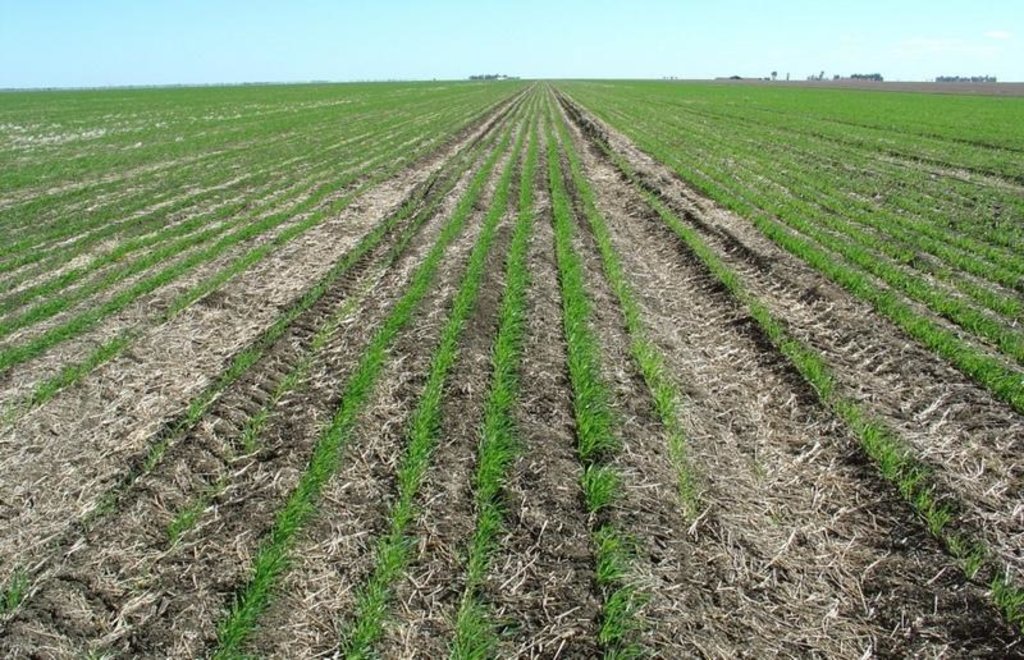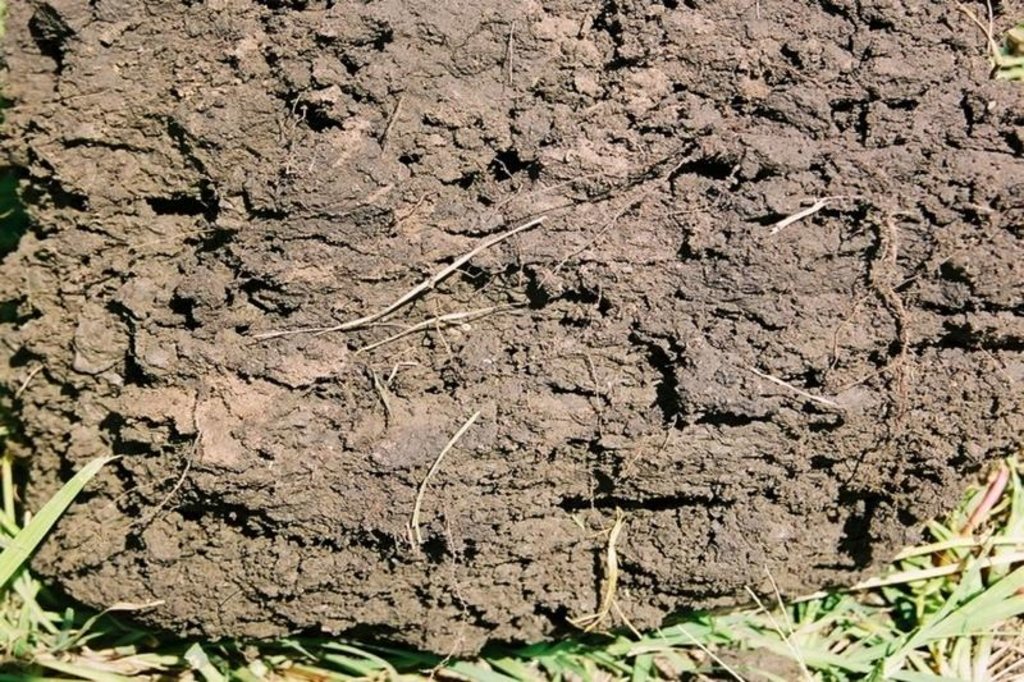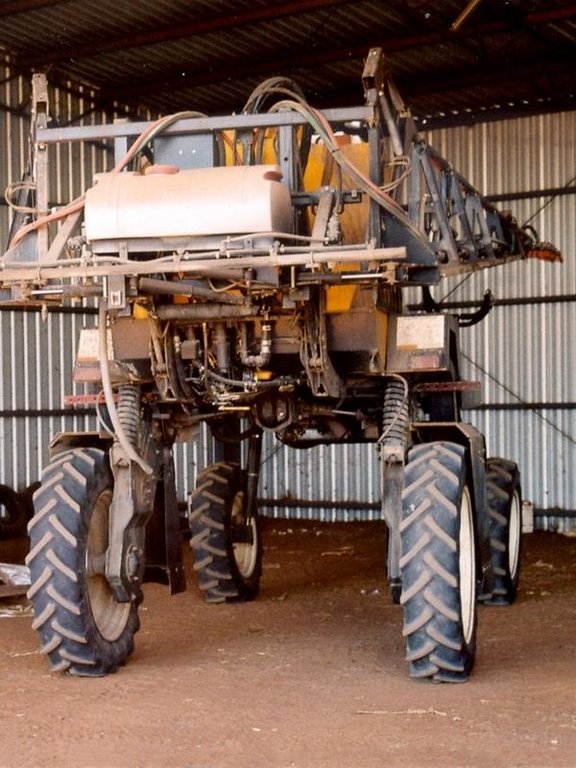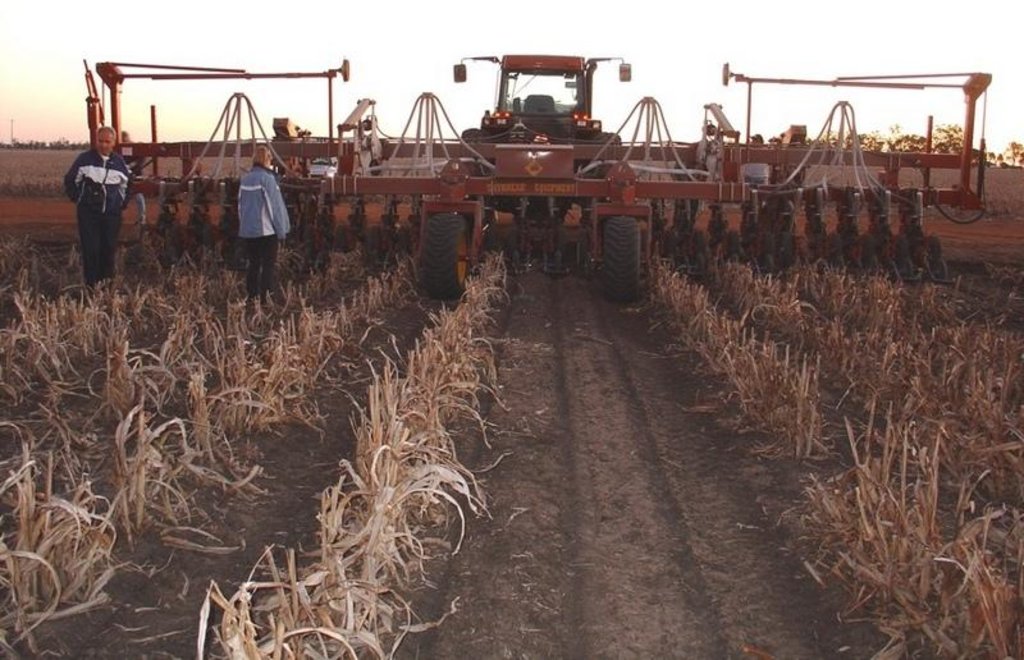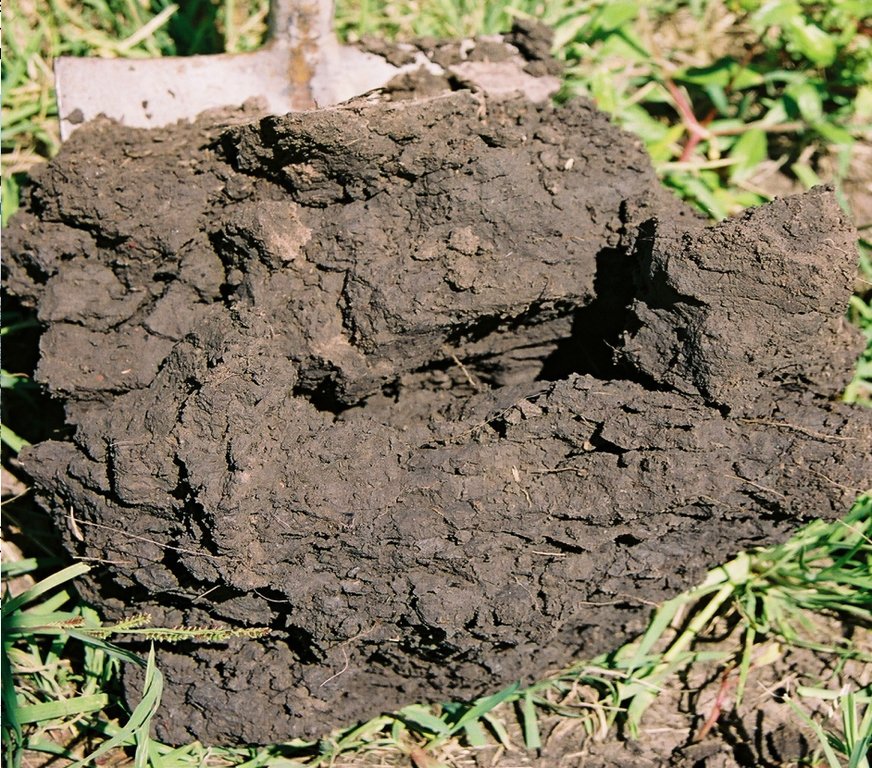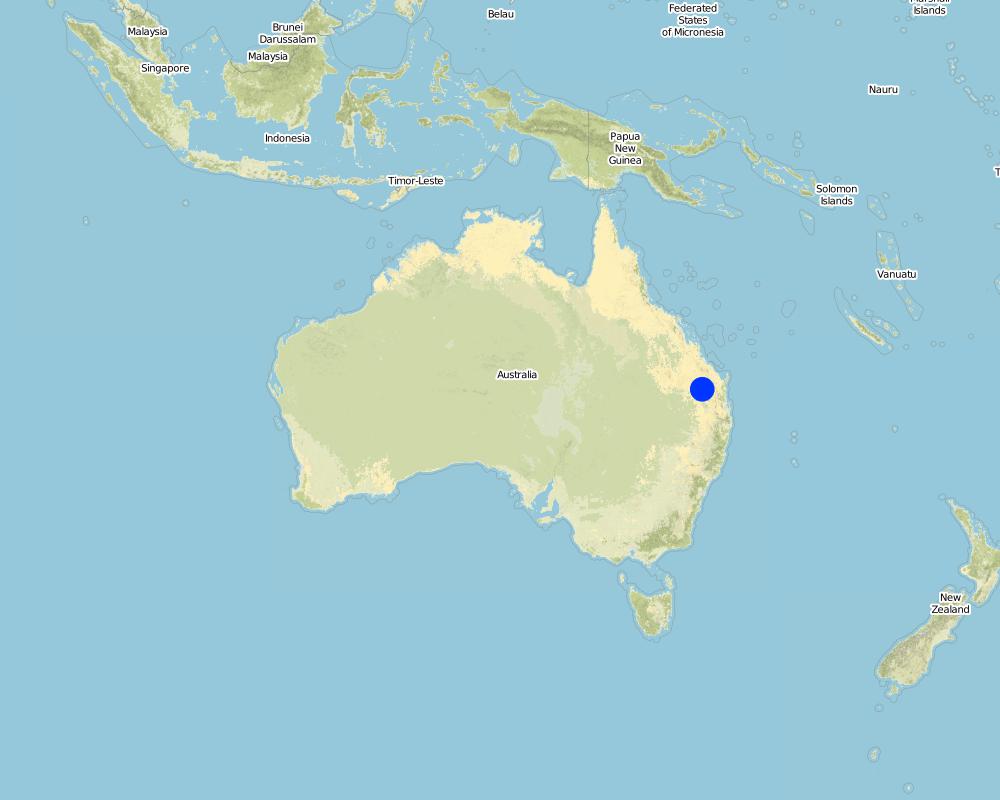No-till with controlled traffic [澳大利亚]
- 创建:
- 更新:
- 编制者: Des McGarry
- 编辑者: –
- 审查者: Alexandra Gavilano, Fabian Ottiger
no-till, permanent uncropped wheel tracks,eliminate soil compaction, judiciois spraying
technologies_945 - 澳大利亚
查看章节
全部展开 全部收起1. 一般信息
1.2 参与该技术评估和文件编制的资源人员和机构的联系方式
SLM专业人员:
Griffith Noel
有助于对技术进行记录/评估的项目名称(如相关)
Book project: where the land is greener - Case Studies and Analysis of Soil and Water Conservation Initiatives Worldwide (where the land is greener)1.3 关于使用通过WOCAT记录的数据的条件
编制者和关键资源人员接受有关使用通过WOCAT记录数据的条件。:
是
1.4 所述技术的可持续性声明
这里所描述的技术在土地退化方面是否存在问题,导致无法被认为是一种可持续的土地管理技术?:
否
2. SLM技术的说明
2.1 技术简介
技术定义:
Large-scale no-till grain production with permanent wheel tracks
common to all on-farm equipment.
2.2 技术的详细说明
说明:
This controlled traffic, no-till farming system (CT/NT) is practiced on a 1,900 ha farm on the broad, almost flat Jandowae Plains in semi-arid Queensland, Australia. Principal soil types are vertisols, with some poorer areas where the sand content is greater, and these have a tendency to hard-set and crust. Over the past five years, the farm owner has changed the farming system completely from conventional farming to no-till with controlled traffic. Controlled traffic means permanent uncropped wheel tracks or ‘tramlines’: all equipment has 2 metre axles. The total farm machinery comprises a tractor, a spray rig and two 11 meter zero-till planter/fertilizer units; one each for wheat and sorghum sowing. The tramlines were laid out two years ago by a contractor using Geographical Positioning System (GPS).
The main technical objective was to eliminate soil compaction. The CT/NT combination ensures the land -between the tramlines - remains in excellent condition. There has been no ploughing or tillage at all in those 5 years. He practices a three year rotation between winter wheat, summer sorghum and fallow, but the system is not fixed: it depends very much on soil moisture status and thus on the rainfall (opportunity cropping). Generally in summer about one third is in summer sorghum and in winter about one third in winter wheat, the rest of the land is
under fallow. The one-year fallow is maintained through the use of herbicides sprayed onto the undisturbed residue from the previous crop. The system is designed for rain capture - to build up soil moisture stores in the fallow periods for subsequent crops - and for disease control (to ‘spell’ the land). During the cropping cycle, the key to his effective weed control system is ‘to get in early’ and ‘actively chase weeds’ through judicious spraying. The farm is now free of the locally common persistent weed Erigeron annuus. In the five years his sorghum yields have risen from 3 to 7 tons per hectares. Over the last three years the soil has improved, becoming soft, friable and moist between his plant lines. Infiltration has improved a lot and soil structure is now excellent.
Tractor use and overall fuel consumption has decreased to less than one quarter of that under conventional tillage. Correspondingly the workload is hugely reduced: from four men required under the conventional system for an equivalent area, the farmer is the sole operator, very occasionally assisted by his son, and a paid contractor for harvesting. He is so satisfied with the CT/NT system that he is attempting to purchase a nearby property to extend the area that he can farm using his current machinery.
2.3 技术照片
2.5 已应用该技术的、本评估所涵盖的国家/地区/地点
国家:
澳大利亚
区域/州/省:
Jimbour (north of Dalby), Queensland
具体说明该技术的分布:
- 均匀地分布在一个区域
如果技术均匀分布在一个区域,则指定覆盖的区域(单位为平方千米):
19.0
如果不知道精确的区域,请注明大致覆盖的区域:
- 10-100 平方千米
Map
×2.7 技术介绍
详细说明该技术是如何引入的:
- 在实验/研究期间
3. SLM技术的分类
3.1 该技术的主要目的
- 改良生产
- 减少、预防、恢复土地退化
- 创造有益的经济影响
3.2 应用该技术的当前土地利用类型
同一土地单元内混合使用的土地::
否

农田
- 一年一作
年作 - 具体指明作物:
- 谷类 - 高粱
- 谷类 - 小麦(冬季)
每年的生长季节数:
- 2
具体说明:
Longest growing period in days: 180 Longest growing period from month to month: Oct - AprS econd longest growing period in days: 180 Second longest growing period from month to month: Apr - Sep
采用间作制度了吗?:
否
采用轮作制度了吗?:
是
如果是,请具体说明:
wheat-sorghum-fallow
注释:
Major land use problems (compiler’s opinion): The farmer’s main reason for starting the combination of CT and NT was to rid himself of soil compaction, in order to achieve better utilisation of locally low and unpredictable rainfall amounts while minimising costs and reducing labour and machinery requirements.
3.3 由于技术的实施,土地使用是否发生了变化?
由于技术的实施,土地使用是否发生了变化?:
- 否(继续问题3.4)
3.4 供水
该技术所应用土地的供水:
- 雨养
3.5 该技术所属的SLM组
- 最小的土壤扰动
3.6 包含该技术的可持续土地管理措施
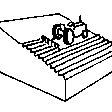
农艺措施
- A3:土壤表面处理
A3:区分耕作制度:
A 3.1:免耕
注释:
Main measures: agronomic measures
3.7 该技术强调的主要土地退化类型

土壤水蚀
- Wt:表土流失/地表侵蚀
- Wg:冲沟侵蚀/沟蚀

土壤风蚀
- Et:表土流失
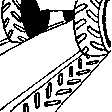
物理性土壤退化
- Pc:压实
注释:
Main type of degradation addressed: Wt: loss of topsoil / surface erosion, Pc: compaction
Secondary types of degradation addressed: Wg: gully erosion / gullying, Et: loss of topsoil
3.8 防止、减少或恢复土地退化
具体数量名该技术与土地退化有关的目标:
- 减少土地退化
4. 技术规范、实施活动、投入和成本
4.1 该技术的技术图纸
技术规范(与技术图纸相关):
Main technical functions: control of raindrop splash, control of dispersed runoff: retain / trap, improvement of ground cover, increase in organic matter, increase of infiltration, increase / maintain water stored in soil, improvement of soil structure, reduction of compaction by traffic, increase of soil fertility
Technical knowledge required for field staff / advisors: moderate; Technical knowledge required for land users: moderate
4.2 有关投入和成本计算的一般信息
具体说明成本计算所用货币:
- 美元
注明雇用劳工的每日平均工资成本:
160
4.3 技术建立活动
| 活动 | 时间(季度) | |
|---|---|---|
| 1. | layout of the controlled traffic lines (tramlines) using GPS mounted in a 4x4 vehicle. Two days were adequate for the whole farm. |
4.4 技术建立所需要的费用和投入
| 对投入进行具体说明 | 单位 | 数量 | 单位成本 | 每项投入的总成本 | 土地使用者承担的成本% | |
|---|---|---|---|---|---|---|
| 劳动力 | Labour | ha | 1.0 | 5.0 | 5.0 | 100.0 |
| 技术建立所需总成本 | 5.0 | |||||
| 技术建立总成本,美元 | 5.0 | |||||
注释:
Duration of establishment phase: 12 month(s)
4.5 维护/经常性活动
| 活动 | 时间/频率 | |
|---|---|---|
| 1. | Layout of the controlled traffic lines (tramlines) | Two days were adequate for the establishment on the whole farm. |
| 2. | Weed control (spray-coupe) with roundup | Summer sorghum (650 ha, during 1 season or half a year) |
| 3. | Fertilizing | Summer sorghum (650 ha, during 1 season or half a year) |
| 4. | Sowing and simultaneous application of starter fertilizer | Mid October, Summer sorghum (650 ha, during 1 season or half a year) |
| 5. | Spraying pre-emergent herbicide to kill summer grasses | Summer sorghum (650 ha, during 1 season or half a year) |
| 6. | Harvest by contractors | early March, Summer sorghum (650 ha, during 1 season or half a year) |
| 7. | Weed control | Winter wheat (650 ha, during 1 season or half a year) |
| 8. | Fertilizing (Urea) | Winter wheat (650 ha, during 1 season or half a year) |
| 9. | Sowing and simultaneous application of starter fertilizer | Mid May, Winter wheat (650 ha, during 1 season or half a year) |
| 10. | In-crop weed spray | Winter wheat (650 ha, during 1 season or half a year) |
| 11. | Harvest by contractors | October |
| 12. | Fallow (1,250 ha) | During 2 seasons or totally 1 year |
| 13. | Weed control (combination of roundup mixed with broadleaf herbicide) | 5–6 times per fallow period |
| 14. | Determine the soil moisture (To determine soil moisture he uses an iron rod; if he can push it into the heavy clay soil, then the soil is moist. Additionally, he measures rainfall) |
4.6 维护/经常性活动所需要的费用和投入(每年)
| 对投入进行具体说明 | 单位 | 数量 | 单位成本 | 每项投入的总成本 | 土地使用者承担的成本% | |
|---|---|---|---|---|---|---|
| 劳动力 | Labour | ha | 1.0 | 5.0 | 5.0 | 100.0 |
| 设备 | Animal traction | ha | 1.0 | 6.0 | 6.0 | 100.0 |
| 设备 | Harvesting by contractor | ha | 1.0 | 17.0 | 17.0 | 100.0 |
| 植物材料 | Seeds | ha | 1.0 | 8.0 | 8.0 | 100.0 |
| 肥料和杀菌剂 | Fertilizer | ha | 1.0 | 53.0 | 53.0 | 100.0 |
| 肥料和杀菌剂 | Biocides | ha | 1.0 | 22.0 | 22.0 | 100.0 |
| 技术维护所需总成本 | 111.0 | |||||
| 技术维护总成本,美元 | 111.0 | |||||
注释:
Machinery/ tools: tactor,spray rig, zero-till planter/fertilizer, iron rod
Comparison of costs between conventional tillage and no-till farming (CT/NT): (1) Labour costs are 4x less in CT/NT: 4 men used to work on the farm (conventional), now the farmer is alone – (plus contractors for harvesting). (2) Average annual diesel consumption: reduced from 108,333 litres (conventional) to 13,636 litres (no-till) which is 8 times less. (3) Costs of equipment to set up a CT/NT system (US$ 240,000) are 3 times less than that for conventional tillage equipment (US$ 700,000).
(4) For biocides he has to invest 5 times more in CT/NT. The conventional values are estimates.
4.7 影响成本的最重要因素
描述影响成本的最决定性因素:
In average one third of the farm area is in crop and two thirds are fallow. This means that overall farming costs per
ha are reduced, since during fallow period activities are limited to spraying herbicides. Labour costs approximately US$ 160 per day. Machinery costs average out at US$ 20 per hour (diesel costs US$ 0.9 per litre). All the data comes from this single farmer. Purchase of equipment is not included in the table above.
5. 自然和人文环境
5.1 气候
年降雨量
- < 250毫米
- 251-500毫米
- 501-750毫米
- 751-1,000毫米
- 1,001-1,500毫米
- 1,501-2,000毫米
- 2,001-3,000毫米
- 3,001-4,000毫米
- > 4,000毫米
农业气候带
- 半干旱
- 干旱
Thermal climate class: subtropics
5.2 地形
平均坡度:
- 水平(0-2%)
- 缓降(3-5%)
- 平缓(6-10%)
- 滚坡(11-15%)
- 崎岖(16-30%)
- 陡峭(31-60%)
- 非常陡峭(>60%)
地形:
- 高原/平原
- 山脊
- 山坡
- 山地斜坡
- 麓坡
- 谷底
垂直分布带:
- 0-100 m a.s.l.
- 101-500 m a.s.l.
- 501-1,000 m a.s.l.
- 1,001-1,500 m a.s.l.
- 1,501-2,000 m a.s.l.
- 2,001-2,500 m a.s.l.
- 2,501-3,000 m a.s.l.
- 3,001-4,000 m a.s.l.
- > 4,000 m a.s.l.
关于地形的注释和进一步规范:
Landforms: Also footslopes and valley floors (both ranked 2)
Slopes on average: Also moderate (ranked 2) and rolling (ranked 3)
5.3 土壤
平均土层深度:
- 非常浅(0-20厘米)
- 浅(21-50厘米)
- 中等深度(51-80厘米)
- 深(81-120厘米)
- 非常深(> 120厘米)
土壤质地(表土):
- 细粒/重质(粘土)
表土有机质:
- 中(1-3%)
- 低(<1%)
如有可能,附上完整的土壤描述或具体说明可用的信息,例如土壤类型、土壤酸碱度、阳离子交换能力、氮、盐度等。:
Soil depth on average: Also shallow and deep (both ranked 2)
Soil fertility: Medium (ranked 1) and high (ranked 2)
Soil drainage: Poor
5.6 应用该技术的土地使用者的特征
生产系统的市场定位:
- 商业/市场
非农收入:
- 低于全部收入的10%
相对财富水平:
- 平均水平
说明土地使用者的其他有关特征:
and own 88% of the land.
5.7 应用该技术的土地使用者使用的平均土地面积
- < 0.5 公顷
- 0.5-1 公顷
- 1-2 公顷
- 2-5公顷
- 5-15公顷
- 15-50公顷
- 50-100公顷
- 100-500公顷
- 500-1,000公顷
- 1,000-10,000公顷
- > 10,000公顷
5.8 土地所有权、土地使用权和水使用权
土地所有权:
- 个人,有命名
土地使用权:
- 个人
6. 影响和结论性说明
6.1 该技术的现场影响
社会经济效应
生产
作物生产
收入和成本
农业收入
社会文化影响
SLM/土地退化知识
生态影响
水循环/径流
多余水的排放
土壤
土壤水分
土壤覆盖层
土壤流失
土壤压实
土壤有机物/地下C
生物多样性:植被、动物
植物多样性
动物多样性
栖息地多样性
其它生态影响
Soil fertility
6.2 该技术的场外影响已经显现
旱季稳定可靠的水流
下游洪水
下游淤积
地下水/河流污染
Transported sediments
6.4 成本效益分析
技术收益与技术建立成本相比如何(从土地使用者的角度看)?
短期回报:
非常积极
长期回报:
非常积极
技术收益与技术维护成本/经常性成本相比如何(从土地使用者的角度看)?
短期回报:
非常积极
长期回报:
非常积极
6.5 技术采用
如若可行,进行量化(住户数量和/或覆盖面积):
200
注释:
200 land user families have adopted the Technology without any external material support
There is no trend towards spontaneous adoption of the Technology
Comments on adoption trend: There isn’t a strong trend now towards growing spontaneous adoption: uptake has slowed dramatically as many conservative farmers prefer to continue their traditional tillage practices.
6.7 该技术的优点/长处/机会
| 编制者或其他关键资源人员认为的长处/优势/机会 |
|---|
|
Land that previously was un-farmable is now under crops. Site inspection shows initially poor land to be now in good condition (after only 5 years). The value of the land has increased How can they be sustained / enhanced? Farmers practising CT/NT can and are buying/leasing more land, which will improve the overall state of the land in Queensland. |
|
Farmers can manage much larger growing areas with less personnel and equipment. A single operator is well able to run a large arable farm on his own How can they be sustained / enhanced? Ditto. |
|
Cereal farming is now less prone to yield losses (and crop failure) in drought years – as there is better rainwater infiltration and water use efficiency with CT/NT How can they be sustained / enhanced? Continue with the system. |
| He has all weeds under control (without need for tillage). |
6.8 技术的弱点/缺点/风险及其克服方法
| 编制者或其他关键资源人员认为的弱点/缺点/风险 | 如何克服它们? |
|---|---|
| The contract harvester runs on 3 m wide axles, so the wheels run on the beds. However, there has only been one wet harvest in 5 years so the incidence of soil compaction from harvesting is negligible | This is not really seen as a problem. One solution would be to build a dedicated harvester (too expensive) or find a contractor with equipment that fitted the system. |
| A conservative mentality towards conservation agriculture is constraining the adoption of the system by other farmers | Continue demonstrating and disseminating knowledge about benefits. |
7. 参考和链接
7.1 信息的方法/来源
7.2 参考可用出版物
标题、作者、年份、ISBN:
Blackwell P (1998) Customised controlled traffic farming systems, instead of standard recommendations or ‘tramlines ain’t tramlines’.In Second national controlled farming conference, pp. 23–26. Eds JN Tullberg and DF Yule.
可以从哪里获得?成本如何?
Gatton College: University of Queensland
标题、作者、年份、ISBN:
Hulme PJ, McKenzie DC, MacLeod DA and Anthony DTW (1996) An evaluation of controlled traffic with reduced tillage for irrigated cotton on a Vertisol.
Soil and Tillage Research 38:217–237
标题、作者、年份、ISBN:
McGarry D, Bridge BJ and Radford BJ (2000). Contrasting soil physical properties after zero and traditional tillage of an alluvial soil in the semi-arid tropics. Soil and Tillage Research 53:105–115
链接和模块
全部展开 全部收起链接
无链接
模块
无模块


